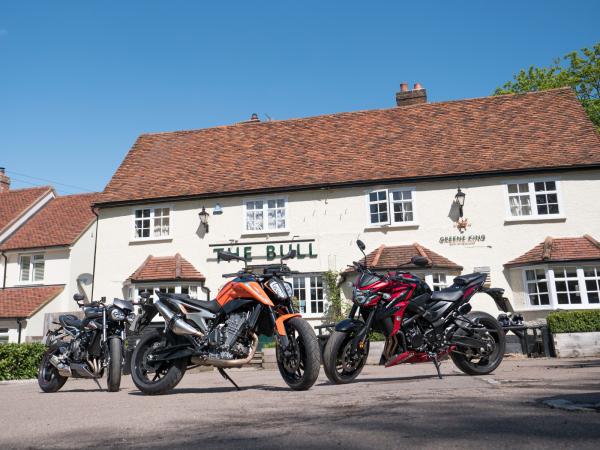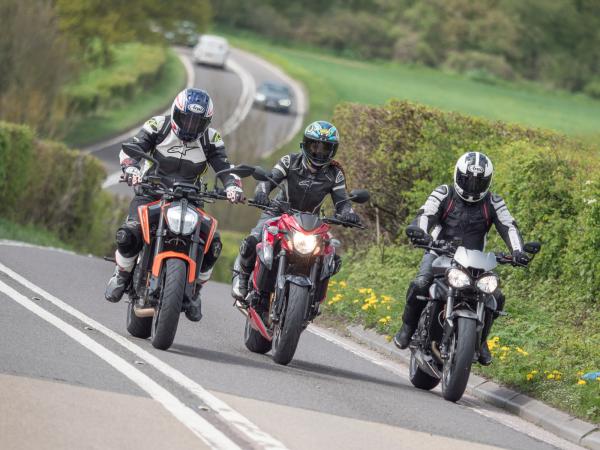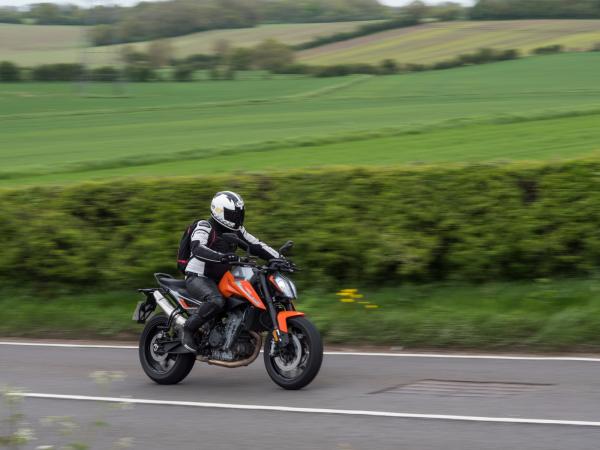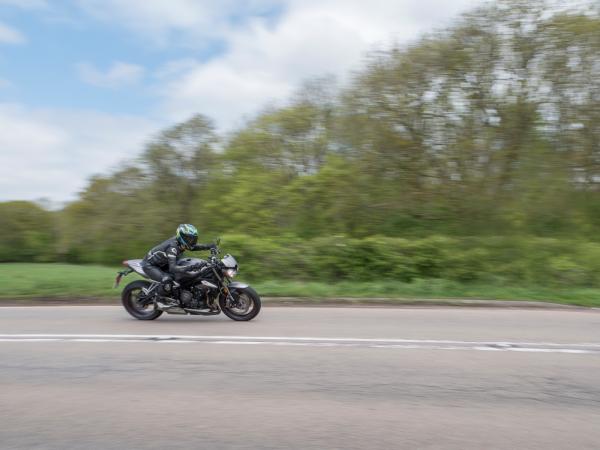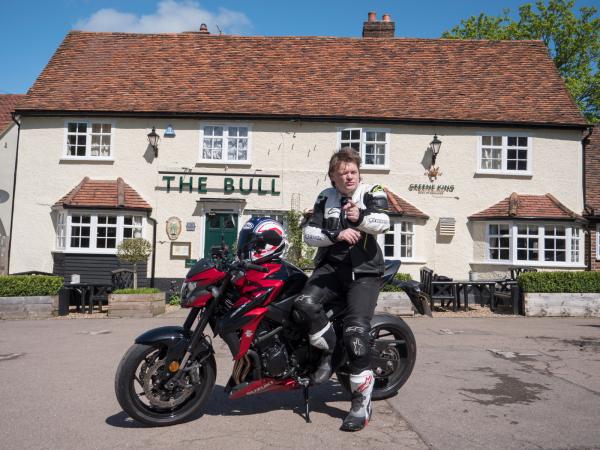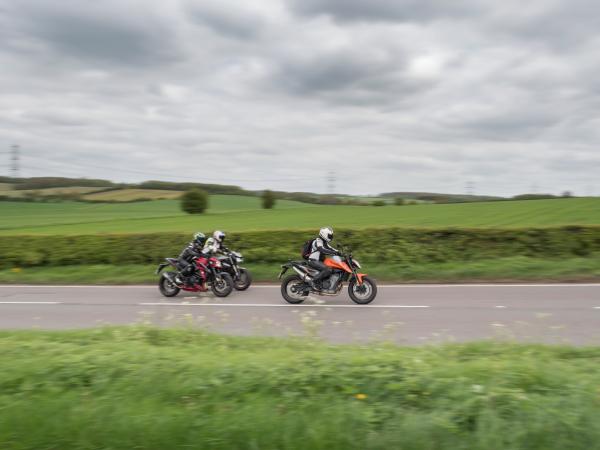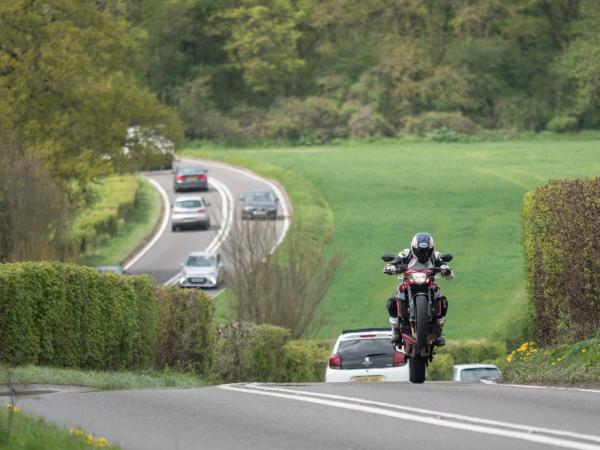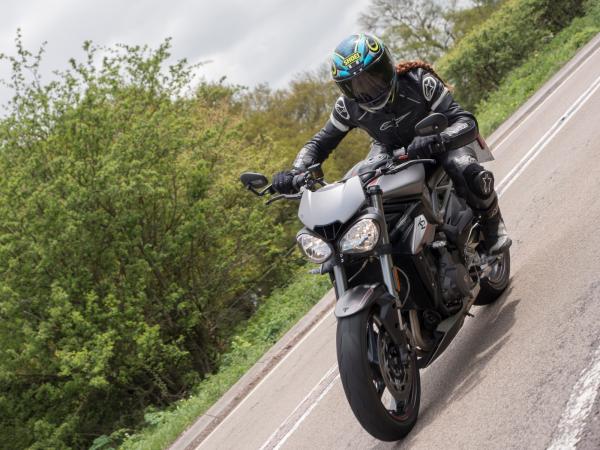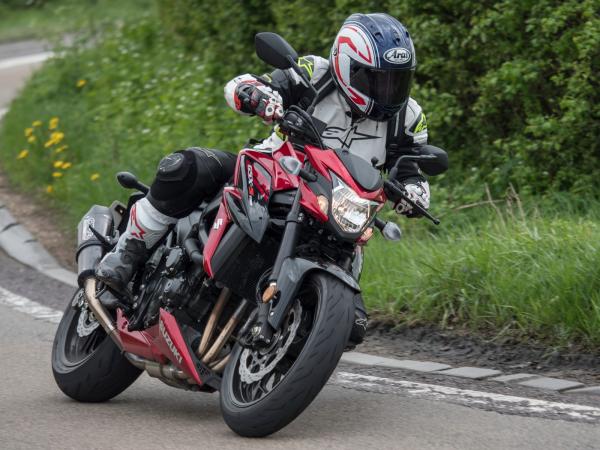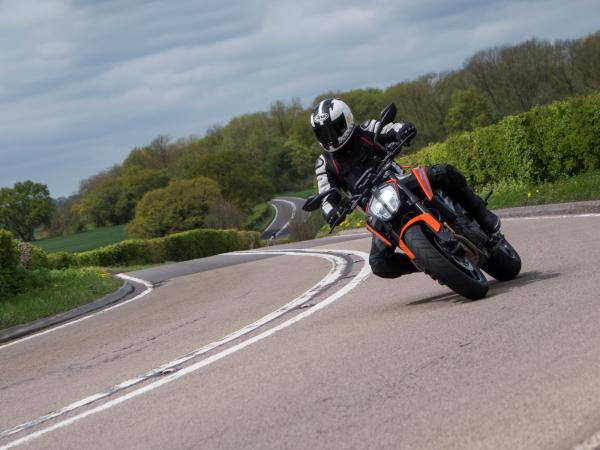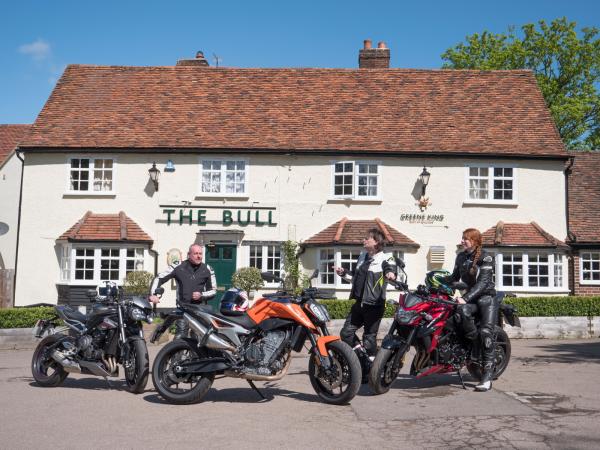Big test: 790 Duke vs Street Triple 765 vs GSX-S750
Naked fun with mucho skids and wheelies

Member for
54 years 8 monthsSOME BIKE tests are properly textbook. All the litre superbikes. BMW R1200 GS vs KTM 1290 Adventure. Buell Ulysses versus half a Trabant (sorry Buell folks! Only kidding!! Ish!!!). Others need a bit of thinking for a clever angle. This one, though, is a bit of both. We had the KTM790 Duke in (at a bit short notice to be fair), and wanted to do a quick group test while we had it in our grubby mitts, as it were.
A Triumph Street Triple 765 seemed like an obvious move – and while Triumph UK was all booked out with its press bikes for some media luvvies day, our top top mate Chris Spinks and the lovely people at Metropolis Motorcycles in Vauxhall had a demo bike we could have a spin on. Two bikes – nicely done. But could we go one better? I was sat pondering as I wrote about the 790’s dyno run – and it came to me. My long-term GSX-S750 outside was putting out very similar power at the tyre to the 790, it was a naked roadster, and while a bit more of a budget offering, wasn’t so far off in terms of price.
And thus came about our test. A new two-cylinder 790 Duke, against a three-cylinder 765 Triumph and a four-cylinder Suzuki 750 (both new last year). Twin vs triple vs four, bingo. Book a snapper, plan a nice day out round Hertfordshire, and we have a winner.
What would win the test though? It’s fair to say I was pretty taken with the KTM, which I’d been pottering about on for ten days already. The engine is a cracker, the chassis is very light and skinny, and while it’s got a bit of that typical KTM ‘street-legal MX bike’ feel, it’s very much a useful road tool, with decent dash, good rider aids, adequate fuel range and enough comfort for a couple of hundred miles in one hit, no worries.
She’s up against a cracker in the form of the 765 Street Triple mind. Launched last year, it was a healthy upgrade on an already-ace machine. From its launch a decade ago, the Street hit the mark perfectly – its initial 675cc form striking an excellent balance between performance and cost, in a good-looking, high-fun package. The tweaked Daytona engine made wheelies easy (virtually compulsory in fact), a slightly anonymous chassis just got on with the job, and later ‘R’ versions added posher suspension and brakes to give an upmarket choice. It was like a mini Speed Triple, and to many, was even more the perfect hooligan bike than the big ‘un.
Triumph pulled a proper flanker last year though, bringing out the Striple with its new made-for-Moto2 765cc triple motor. A genius move of course, and even if they’d not done much else, they’d have had a corker on their hands. But we got a new chassis, and no less than three (five if you include 675cc A2 and low seat versions) varieties. The base ‘S’ bike came with cooking running gear including twin-piston brakes and Showa suspension. The R got 5bhp more and swisher brakes and fully adjustable suspension, and the top-spec RS got full-beans Brembo brakes and an Ohlins rear shock. Woo. And it’s an RS we have here today.
At the other end of the fancy-dan scale sits the GSX-S750. I’ve had this one for a couple of months now, and while trips away mean I’ve not had as much time on it as I’d have liked, I’m still quite fond of it. It’s not a flash bike, with little in the way of posh bells and whistles – just a GSX-R750-based engine, steel tube frame and some cooking suspension and brakes. It all works well together though – like Suzuki’s SV650, it might be a few notches off the premier league on paper, but when you just want a bike to get on and ride, it’s got a lot going for it. The GPR silencer and Pirelli Diablo Rosso Corsa II rubber I’ve fitted will give the Suzuki a bit of a helping hand in this company – but not enough to sway the test I’d think.
Our test day dawned bright and sunny, and once I’d dumped the kids at breakfast club, I was off, down the A3 to the M25 on the 790 I’ve had all week. I meet Laura on the 750 under the A3 and we swap over for the ride to Hertfordshire. The first thing to hit you is how much bigger and heavier the GSX-S is than the 790. It really does feel like a totally different class of bike, like you jumped off a CBR600RR onto a Hayabusa. Where you’re perched up high on the KTM, much like on Ducati’s Hypermotard, or a small-bore dirt bike, there’s a lot more GSX-S round about you. In the old road test cliché, you sit ‘in’ rather than ‘on’ the 750, compared with the 790. The inline-four engine is obviously a lot revvier than the punchy KTM twin, and together with the considerable extra mass, it’s a less sharp tool for sure. But when a car changes lanes suddenly on me round the Heathrow section of the M25, the Suzuki’s brakes are far more powerful than the 790’s. As I said in the main first ride of the KTM, its brakes were a bit disappointing, with much less in the way of stopping power than you’d expect. By comparison, the radial Nissins on the 750 are a step above in feel and sheer power. As I also said in the first ride, I think there was a problem with that bike – glazed, worn or contaminated pads, because other folk reckon the brakes are decent.
We’re at South Mimms before we know it, and Chris is there already on the 765. A quick top-up of gas, and we’re up the A1(M) like rats up a drainpipe to meet Tom the snapper near Baldock. He’s got a very good road in mind for the test, and we swap bikes again for the first run down the twists and turns of the A507 to Buntingford.
I grab the 765, and am immediately taken back to last year when I first rode the beastie. It’s another step up in terms of sophistication and class after the GSX-S750, with high-end suspension and brakes, a posh colour LCD dashboard, complex rider aids package, and a neat quickshifter. The engine is another corker, with delightful grunt and solid top-end, though at a claimed 123bhp (we didn’t get a chance to dyno it) it’s not a world away from the GSX-S750 and Duke – maybe ten bhp more than the 100-odd rear wheel bhp that the other two have. It’s made in a luscious way though – that triple treat which we love in all its forms really – be it MV Agusta’s 800, Yamaha’s 850 MT-09 engine or the bigger 1050 and 1200 triples Triumph itself makes. The halfway-house between punchy grunt-twin and scweamy scweamy inline-four, nowadays optimised by advanced engineering, balance shafts and cunning electronic fuelling is supremely satisfying on the road.
The balance of torque and power lets you be lazy with the gears when you want, lolloping along in a high ratio and just opening up the throttle to ride out the grunt. But when you’re in the mood to play, you can kick down a few gears, crank up the revs, and revel in the raucous roar that rumbles out of the airbox right under your chin. Either way is great fun, and with the Showa Big Piston Forks, Brembo M50 calipers and Ohlins STX40 shock – plus Pirelli Super Corsa rubber - you’ve got all the tools to make the most of that power too.
What does get in the way a little is the rider aids. As is common these days, the traction control takes a bit of work to turn off completely, and it’ll come back on as soon as you turn your back. Now I’m as fond of not-crashing as the next bloke, for sure. But to be honest, the number of crashes I’ve had over the years which TC would have saved has been fairly minimal. And I do like to try a wheelie now and again. So I’d not complain if there was a hard switch to turn it off completely, rather than having to faff about every time you set off to make sure it’s off. Now, the KTM is similar in that its TC will come on every time you start the engine – even if you just hit the kill switch, or even stall it at some lights (which I managed in London). Soon as you press the starter, the TC re-appears, like Banquo’s buzz-killing ghost. Ironically, the GSX-S750’s lower-tech TC setup is the most user friendly: turn it off, and it stays off. Now, the Suzuki is less aggressive in the lower gears than the Triumph. But we’re all adults here – and the nannying of the TC on the 790 and 765 was grinding my gears a bit on this test.
On the Baldock road, there’s a decent variety of corners, which test the chassis setups on all three bikes really well. They’re very different of course, with the 750 having the most heft, the 765 most sophistication, and the 790 the most aggression and precision. Sadly, the KTM’s brakes let it down quite badly, and you had to work so hard at hauling her down from speed on the corner entry, that it often upset you all the way through the bend. I adapted as best I could, and to be fair, once you had it lined up and on its ear, the KTM was a delight mid-corner, the (surprisingly good) Maxxis rubber holding onto the shellgripped twisties for grim death, and the capable WP suspension soaking up any nasty bumps.
Next up is the 765, and it’s definitely something special in terms of chassis refinement. If the 790 is like a nutter supermoto, and the 750 a bit of a big soft sporty touring bus, the 765 is a proper little racebike. There’s a tautness to the suspension, balanced with plush action, that makes all the difference, even on the fairly decent asphalt down this road. The Super Corsas are working well in these warm dry conditions (they were a horrorshow at the cold, rainy launch last year mind you), and the Brembo brakes sing that racebike zingy sound as the haul you down in a big hurry.
Last is the 750, and it’s by no means least. The softer-edged suspension and more relaxed geometry settles you down and makes you feel at home. Simply having more bike, and more room to shuffle about does make it feel like a bigger machine, and it’s easy to hustle the GSX-S harder than you’d think. The brakes are good, the steering’s been sharpened up nicely by the Pirelli rubber (though the stock Bridgestone S21s are not bad), and the suspension doesn’t really suffer much at all from being a little softer.
As the day wore on to a close, I had to jump on a bike to head home. Logistics meant I had to take the GSX-S or the Duke, and unsurprisingly, I plumped for the orange meanie. Summing the bikes up in my head during the motorway slog home, I was trying to come up with a textbook roadtest 1-2-3, and was struggling a little to be honest. Okay, in terms of pure performance and spec, the Suzuki has to be behind the other two – it’s heavier and has less power than the Triumph, and is a notch lower in terms of chassis jewellery and high-techery. But what it does have works well, the rider aids are simple and no fuss, while the engine is still a classic. If finances mean you have to plump for this cheaper option, you’re really not going to suffer too much.
Crank up the PCP payments a bit though, and you will be rewarded for sure. Both the Street Triple and the 790 Duke are amazing machines, with exhilarating performance packages, especially their engines. The new KTM 790 lump is hilarious, and I can’t wait to see it in other bikes – there’s an Adventure version in the pipeline of course and a natty little GT version would be corking. In this guise though, it absolutely rules round town, and does well out on more open roads too. Compared with the Street Triple, it’s lighter, skinnier and nuttier.
And for me, that’s what the choice between these two top contenders boils down to. The KTM is pure, undiluted fun, with little in the way of distractions or home comforts. The Triumph on the other hand is a more rounded machine, with more presence, and a wider range of skills. If you had to use the 765 for some light touring, or a medium distance commute, it would be more useful than the KTM, and at a trackday, the fancier suspension would pay dividends in terms of adjustability and performance. You do pay extra for that of course – an additional £1700, which is a sizeable chunk of change. The perfect answer might well lie with the lower-spec Street Triple R though – it’s £1k cheaper than the RS, £700 more than the Duke, and still has high-end Brembos and fully-adjustable Showa suspension front and rear, together with 5bhp less from its 765cc motor.
For me, as a man living inside the M25, who likes a cheeky wheelie now and then though, I think I’d go for the KTM. The cash savings over the Street Triple would buy a little flyscreen, and if you were bothered, maybe a better rear shock. The crackers engine wins the day though – it really is an awesome powerplant, and makes the Duke 790 the textbook choice in this test for sure…
Laura's thoughts:
Like Alan, I’m sat on a fence between the Street Triple and the Duke. The Triumph is beautiful, refined, and a bike I’ve been coveting for a long time now.
But then there’s the Duke. That flaming orange wonder which calls to my inner yobbo to come out and play. It embodies KTM’s loud, shouty attitude, and delivers it in a brilliant, lightweight and potent package. You can see why the Austrian manufacturer has dubbed it the scalpel, as it’s just so achingly sharp on everything – handling, suspension, acceleration. Even the seat feels like it’s been carved from a slice of Grossglockner – it’s just so damn solid!
Admittedly, the KTM falls far behind the Triumph in terms of ride comfort, and its newly-developed parallel twin is still no match for Triumph’s wonderful triple – it is built for Moto2, after all. Power delivery down low on the Duke wasn’t that great to be honest, with an ‘all or nothing’ feel about it as I pulled away at junctions. The brakes fell far short of the RS’s Brembos, although as Al mentioned that could be due to previous user error.
But its rogue nature works to its benefit. If ever there was a bike to bring back your youth, this would be it, with the tall, chuckable nature reminiscent of a road-going trailie. And as I’m still technically a ‘youth’ myself, my vote has to go to the KTM. The Street Triple remains an object of my dreams but one for when I have a bigger budget and a better attention span.
And finally, while the GSX-S is a remarkably accomplished ‘budget’ bike, it lacks the wow factor of the two European machines. It’s a tad too sensible, with that wonderfully comfortable seat, encompassing form, soft suspension and smooth inline four. On second thoughts…
KTM SPECS
Price: £8,499
Engine: 8v DOHC, liquid-cooled parallel-twin, 799cc
Bore x stroke: 88 x 65.7mm
Compression ratio: 12.7:1
Max power: 99.65bhp@9,2750rpm (measured at tyre)
Max torque: 60.72ft lb@7,750rpm (measured at tyre)
Transmission: six speed, chain drive
Frame: steel tube
Front suspension: WP 43mm USD forks
Rear suspension: WP preload-adjustable monoshock
Brakes: twin 300mm discs, four-piston radial caliper (front), single 240mm disc, dual-piston caliper (rear), cornering ABS.
Wheels/tyres: aluminium/Maxxis, 120/70 17 front, 180/55 17 rear
Rake/trail: 24°/98mm
Wheelbase: 1,475mm
Dry weight (claimed): 169kg
Fuel capacity: 14 litres
GSX-S750 Specs
Price: £7,699
Engine: 16v inline-four, DOHC, liquid cooled, 749cc
Bore x stroke: 72x46mm
Compression ratio: 12.3:1
Max power (claimed): 101.66bhp@10,500rpm
Max Torque (claimed): 55ft lb@9,000rpm
Transmission: six speed, chain
Frame: steel tube diamond-type
Front suspension: preload adjustable 43mm USD forks
Rear suspension: preload adjustable monoshock
Brakes: Nissin four-piston calipers, 320mm discs (front), single disc rear
Wheels/tyres: ten-spoke cast alloy/Bridgestone S21, 120/70 17 front, 180/55 17 rear
Rake/trail: na°/na mm
Wheelbase: 1455mm
Kerb weight: 213kg
Fuel capacity: 16 litres
Colours: red/black, blue
Street Triple Specs
Price: £10,200
Engine: 12v inline-triple, DOHC, liquid cooled, 765cc
Bore x stroke: 78x53.4mm
Compression ratio: 12.65:1
Power (claimed): 123hp@11,700rpm (RS) 118hp@12,000rpm (R) 113hp@11,250rpm (S)
Torque (claimed): 57ft lb@10,800rpm (RS), 57ft lb@9,400rpm (R), 54ft lb@9,100rpm
Transmission: six speed, slipper clutch, chain
Frame: aluminium twin spar
Front suspension: 41mm fully-adjustable Showa USD forks (S has SFF forks, R has SF-BPF, RS has BPF
Rear suspension: Showa shock (S and R), Ohlins STX40 shock (RS)
Brakes: Nissin twin-piston sliding calipers (S), Brembo M4.32 four-piston radial calipers (R), Brembo M50 four-piston radial calipers (RS) 310mm discs (front) 220mm disc, single-piston Brembo caliper (rear)
Wheels/tyres: cast alloy/Pirelli Diablo Rosso Corsa/Supercorsa (RS), 120/70 17 front, 180/55 17 rear
Rake/trail: 24.8°(S) 23.9° (R&RS)/104.3mm (S) 100mm (R&RS)
Wheelbase: 1,410mm
Dry weight (claimed): 166kg
Fuel capacity: 17.4 litres
